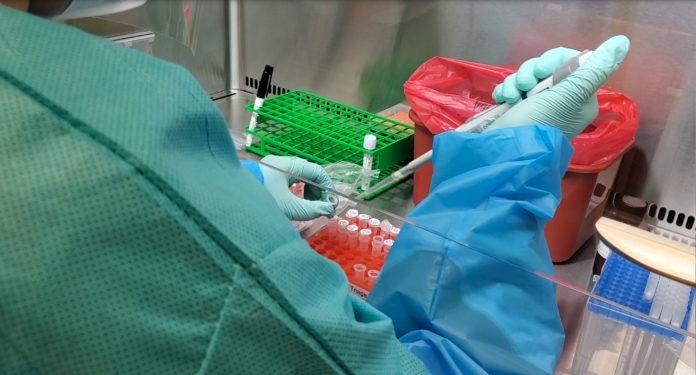Revenue surged to nearly $360 million, 45 times the level of the same quarter a year ago, driven by a 290-fold increase in total test results delivered for 3.8 million patients as demand skyrocketed for Fulgent’s Covid-19 testing services.
Net income shot up to $200 million, a complete turnaround from the loss of $2 million a year ago. Gross margins improved 32% in the quarter. And the company has roughly $700 million cash on hand.
Yet the release of this earnings report did not stem the steady slide in the company’s stock price. From its high of $183 just three months ago, Fulgent shares closed May 10 at $68.47, a drop of more than 60%.
Investors, it seems, are nervous about just how long Fulgent can ride the Covid-19 testing wave as the pandemic appears to have eased its grip on much of the nation. They want to know what’s next for the 10-year-old genetic testing company.
Fulgent executives spent much of their quarterly earnings presentation trying to reassure investors and analysts that the building blocks are in place for continued growth after demand for Covid testing diminishes.
They announced that the company had raised its revenue guidance for the rest of this year to $830 million from $800 million. And they projected that revenue from the type of genetic testing the company did before the pandemic will nearly triple this year to $170 million.
“We have built a genetic testing business on a strong technology foundation and that is scalable into new areas with minimum overhead and investment, and we believe this positions us extremely well for substantial growth and allow us to become a leader in the very broad genomic diagnostic market,” Ming Hsieh, Fulgent’s founder and chief executive, said during the company’s call with analysts.
For starters, Hsieh and other Fulgent executives said Covid-related testing work is far from winding down. While the number of individuals going for Covid tests is dropping as more people are getting vaccinated, the demand for “return to normalcy” testing of people to make sure they are Covid-free as they reenter the workplace is picking up, according to Brandon Perthuis, Fulgent’s chief commercial officer.
“We believe our history of delivering gold standard RT-PCR testing at scale with rapid turnaround time positions us perfectly to address this demand,” Perthuis said. The PCR, or polymerase chain reaction, test detects coronavirus RNA molecules and is considered more thorough than the rapid antigen tests that only detect protein fragments.
In addition, Fulgent picked up a key contract during the first quarter from the Centers for Disease Control and Prevention: up to $47 million for Fulgent’s advanced genetic sequencing technology to screen for SARS-CoV-2 variants.
That screening will play a crucial role in determining which variants of the virus are circulating in the United States, which in turn could determine the need for subsequent booster vaccine shots.
According to Perthuis, a pilot variant screening program developed by Fulgent helped discover the California-specific Covid variant that was circulating during the deadly early winter surge that swept through the state.
Fulgent has even entered the vaccination side of the effort against Covid. During the first quarter, the company launched a vaccine management platform to allow consumers to find a vaccine dispensing location, schedule an appointment, receive reminders and track their vaccination.
Looking beyond Covid
Looking beyond Covid
This segment includes the more detailed genetic analysis of Covid variants that Fulgent is providing to the CDC, as well as its non-Covid genetic testing business.
In past quarters, Fulgent executives have said the company’s higher profile during the Covid-19 pandemic has resulted in increased demand for its other services, such as home genetic testing.
Looking ahead, Hsieh said the company is now exploring opportunities to use its genetic testing platform to detect various types of cancer.
“We see a number of opportunities in oncogy testing, which we have just begun to scratch the service,” Hsieh said in the earnings conference call. “And we believe that with our scalable technology platform and a track record for execution, we are extremely well positioned to capture on the large opportunities in this area.”
Fulgent also announced last week that it has invested another $19 million in a joint venture it formed in 2017 with two Chinese companies, Xilong Scientific Co. Ltd. of Guangdong and Fuzhou Jinqiang Investment Partnership of Fuzhou, to go after rare disease genetic testing contract opportunities in China. The investment gives Fulgent majority ownership of the joint venture company.
“Our operations on the ground in China leverage our same technology platform, extensive test menu and the efficient lab management system as our infrastructure in the U.S.,” Hsieh said.
“We see a significant opportunity with additional investment to meaningfully grow our presence in this large and growing genetic diagnostic market,” he added.
Hsieh also hinted at the prospect of future acquisitions. As of March 31, Fulgent reported it had nearly $700 million cash on hand, enough for one or two large acquisitions or several smaller ones.
“We are also continuing to evaluate M&A opportunities that will be a natural expansion for our existing business to fuel our expansion,” he said.
Some skepticism
Some skepticism
Erin Wright, a research analyst with Credit Suisse in New York, said in a May 11 update report that Fulgent’s possible entry into the oncology genetic testing market puts it in competition with many other companies.
“We maintain our ‘Underperform’ view at this juncture,” Wright wrote. “While conceptually appealing, we view some of these investment areas will take time to build traction more meaningfully, particularly across the oncology testing market, which has become increasingly crowded.”
Wright added that she believed a sharp falloff in Covid-19 testing volume has not been fully factored into future expectations for Fulgent.
“We view enthusiasm for shares remains disconnected from its underlying fundamentals and the long-term growth/profit prospects of its core business” she said.
It would seem that — since March at least — Fulgent investors have agreed with that view.

